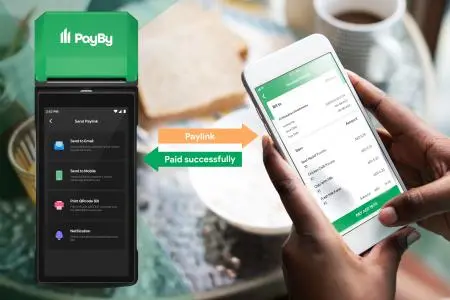PHOTO
- Orders are recorded on POS so business data is easily tracked and managed
Dubai, UAE: Innovative fintech start-up PayBy has launched Send Paylink, a new Point of Sale [POS] feature that enables quicker and easier sales. Using their PayBy POS, merchants can create a payment link to send to customers. When customers receive the link, they can pay through the PayBy app or with their bank card, instead of paying by cash.
PayBy’s Send Paylink is flexible and robust enough to be used across diverse businesses and use cases. Payment links can be embedded in emails, text messages, or over messaging apps. Merchants can start accepting payments within minutes, without having an e-commerce website or writing any code. Orders processed through Send Paylink are recorded on the POS platform so that merchants can conveniently check and manage business data.
Consumers need not pay store staff with cash on delivery when they order goods. Payments can be processed through the PayBy mobile wallet, or via bank cards online.
Dr Mahmoud Alkouz, Operations Manager at Al Ain Pharmacy said: “PayBy’s new POS feature, Send Paylink, is a welcome development for businesses that want to accept digital payments from customers, without the hassles of websites, apps or sustaining the risk of cash on delivery (COD). It simplifies payments and diversifies revenue streams for all kinds of UAE businesses, including pharmacy chains with existing payment systems – any PayBy merchant can create a payment link on POS to send to their customers. This is a perfect example of combining technology with strategic vision to bring digital solutions to life.”
PayBy offers merchant solutions for every type of business in the UAE, from small merchants to large stores that serve thousands of customers daily. These cost-effective solutions will support local businesses and help them provide a better user experience and reach a wider consumer base immediately.
Financial transactions on PayBy are well protected by leading and proven technologies, including AI-based security management system, in strict accordance with the PCI-DSS standards.
PayBy also provides digital payment services covering multiple scenarios, such as retail purchases, hotels, taxis, utilities, and mobile top-ups. PayBy uses a QR-code based payment system to enable contactless and cashless payments. The QR code generated by PayBy is based on tokenisation – widely acknowledged as a more secure payment method as it allows the payment to be processed without exposing sensitive payment information. The PayBy App is currently available in Apple Store, Google Play, and Huawei Store.
© Press Release 2021
Disclaimer: The contents of this press release was provided from an external third party provider. This website is not responsible for, and does not control, such external content. This content is provided on an “as is” and “as available” basis and has not been edited in any way. Neither this website nor our affiliates guarantee the accuracy of or endorse the views or opinions expressed in this press release.
The press release is provided for informational purposes only. The content does not provide tax, legal or investment advice or opinion regarding the suitability, value or profitability of any particular security, portfolio or investment strategy. Neither this website nor our affiliates shall be liable for any errors or inaccuracies in the content, or for any actions taken by you in reliance thereon. You expressly agree that your use of the information within this article is at your sole risk.
To the fullest extent permitted by applicable law, this website, its parent company, its subsidiaries, its affiliates and the respective shareholders, directors, officers, employees, agents, advertisers, content providers and licensors will not be liable (jointly or severally) to you for any direct, indirect, consequential, special, incidental, punitive or exemplary damages, including without limitation, lost profits, lost savings and lost revenues, whether in negligence, tort, contract or any other theory of liability, even if the parties have been advised of the possibility or could have foreseen any such damages.




















